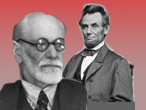Ron Paul has fought hard, both with logic and organization, to bring his ideology and his candidacy to the forefront.
From the perspective of PsychePolitics, he has had both conscious and pre-conscious obstacles, and he seems to have overcome all but one. His first obstacle was his age. He looks like a grandfather, not a father. Leaders must not look unparental. Nonetheless, unlike John McCain, who looked like a frail grandfather next to the more parental Barak Obama, Paul still looks alive. Barely, but alive. Anyway, it is an obstacle he overcame. He also overcame his attire. His suit jacket never fits. Saturday Night Live caught it, and so did the multitudes of viewers. Anyway he overcame it, too.
So, before getting to what he will likely not overcome, let’s look at how he achieved such success. First, he addressed suppressed issues in many Americans. They don’t like government either. He also addresses fiscal irresponsibility. All to many fiscally responsible Americans have had to suppress their value of this, as politicians of both sides stopped doing so years ago. So, in this sense, Ron Paul used populism to gain support.
But Paul did another thing, whether consciously or not. He used duality. As explained by PsychePolitics, duality is the way we humans think about problems, from the most simple to the most complex. We break things down into two’s. The press intuitively knows this, and it tends to present complex issues as a contrast, one versus the other. This was first seen in my lifetime in the 1960’s, when Congressman Pete McCloskey and four more senior members of the U.S. House went on a “fact finding” tour of Vietnam. The senior four expressed the same view. It’s not important what that view was. What is important is that McCloskey expressed a different view. Guess who appeared on the TV shows covering that visit: McCloskey and only one of the other four. In this way, McCloskey went from 20% (one fifth) of the attention to 50% (one half). Paul did this, too. His ideology got him noticed. It was Paul vs. 8 or so others. In fact, he went from one ninth to one half, or much closer to it than better healed, more virile and parental appearing other candidates for the Republican Presidential nomination.
Now, however, push has come to shove. The Iowa caucuses will be held in two days. The media barrage has been intense. Here is where his Achilles heel will be a matter of focus. It is his military philosophy. He favors retreat. Non-involvement.
The issue will be debated at the conscious level, but it is of course at the unconscious level that so much of our decision-making occurs. The rest is rationalization. Here’ how it works:
In PsychePolitics, one can see how the unconscious difference between the two American Parties is not liberalism versus conservatism. That is only the surface. The difference is gender identification. The Democratic Party identifies with the mother of two generations ago, while the Republicans identify with the father of two generations ago. Despite the near equality of male and female in today’s world, the parties’ identifications and values were fixed in their minds when they were 2 or 3 years old. This will be explained in a separate post.
So, given the gender values of the two parties, let’s focus on Paul’s party, the Republicans. They have unconscious identifications with father. They value what fathers and men in general value. There are many such things, but let’s take military involvement. Men value it. Men de-value its opposite, and sometimes call it cowardice. Men are the first line protectors of the family. While they value nurturing, they value protecting and providing more. So, when Paul talks about retreat, it runs counter to something in men/father/Republicans. It makes them feel uneasy, uncomfortable, anxious. It runs counter to masculine values. In other words, men would feel, “As a man, I value fighting back, even war. Now you tell me fighting back and even war are unimportant, not to be valued?” Paul creates a disconnect, a dissonance, anxiety–and people don’t vote for someone who makes them anxious.
Now, Paul certainly does achieve duality with this anti-war stance. However, he fails at populism, which ultimately is the support of suppressed issues and values, allowing their emotions to be expressed. It is for this reason that he will fall short. One cannot achieve a large following in a party valuing action and courage, when what he seems to favor is retreat and cowardice. That is how he’s being perceived. To the extent that is really not true about him, Paul has not communicated it. Rather, he has communicated cowardice. His policies run counter to the Republican psyche, making them anxious. Again, people tend not to vote for someone who makes them anxious.
And that’s why he won’t win the Republican nomination for president.

 Can you immagine how the political ideas and aspirations envisioned by Abraham Lincoln and the exploration of the psychological mind explored by Sigmund Freud can be seen as one entity?
Can you immagine how the political ideas and aspirations envisioned by Abraham Lincoln and the exploration of the psychological mind explored by Sigmund Freud can be seen as one entity?
Dr. Lurie, you hit the nail on the head in the above blog.
Several residents of Lake Jackson, Texas (Paul’s home town) were interviewed on a network news show.
When asked why they supported his candidacy, they replied because he was great man and they agreed with his political philosophy.They also added that as an obstetrician he delivered most of the residents of this very small town. I guess that would make them happy because the only alternative was the local veterinarian!!!!!!